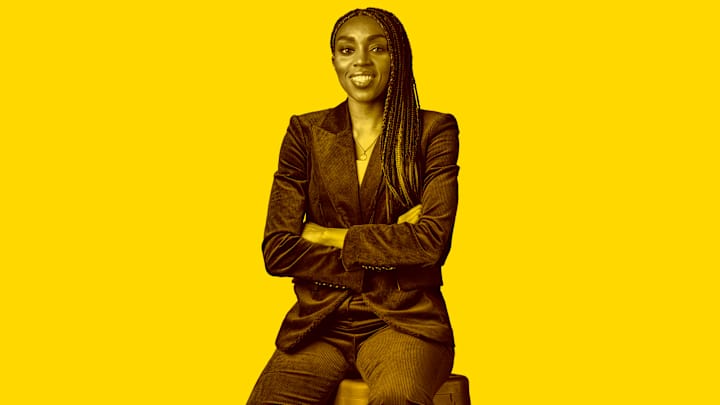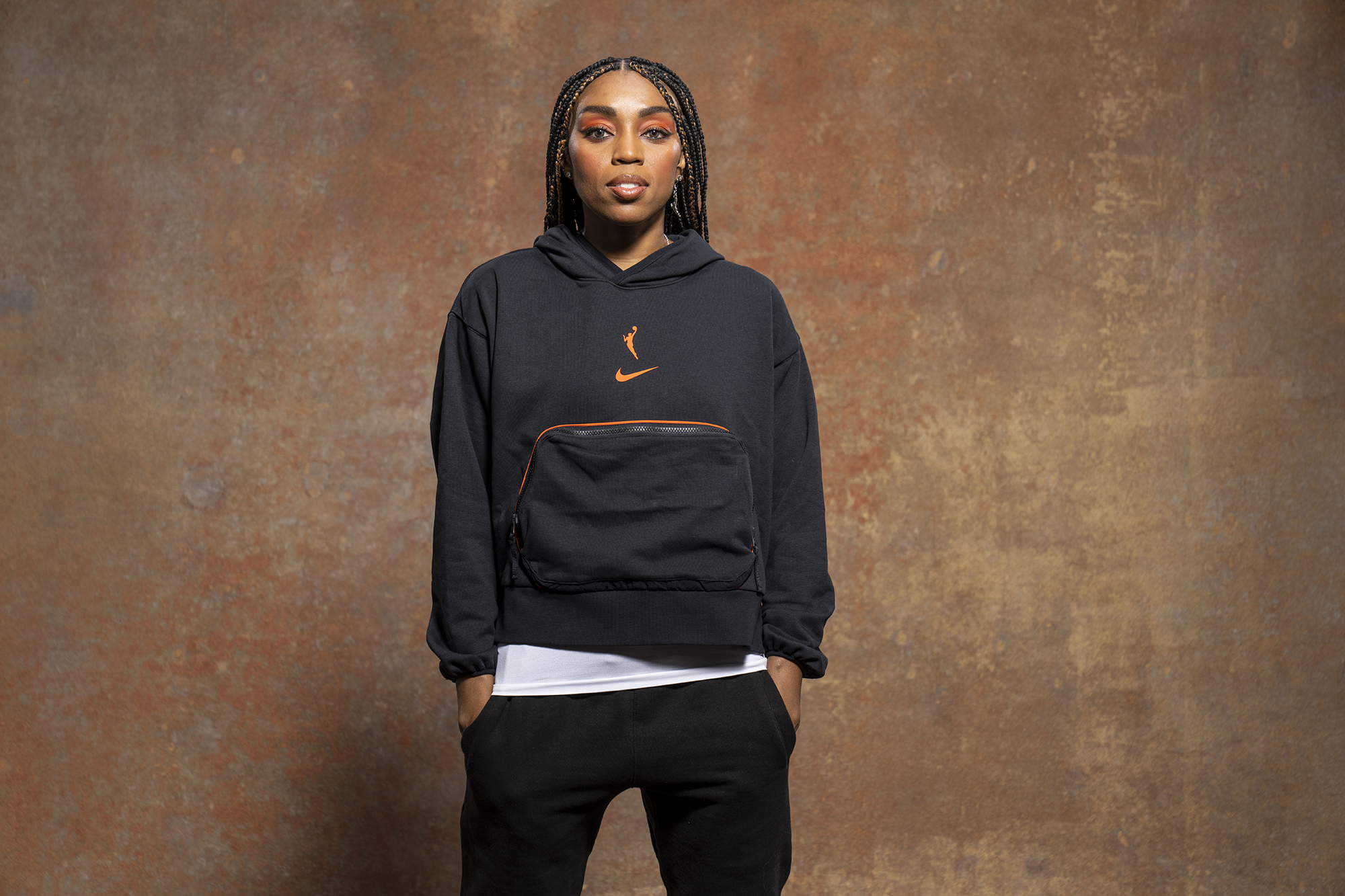From the Backcourt to the Front Office, Renee Montgomery Can Do It All


Sports Illustrated and Empower Onyx are putting the spotlight on the diverse journeys of Black women across sports—from the veteran athletes, to up-and-coming stars, coaches, executives and more—in the series, Elle-evate: 100 Influential Black Women in Sports.
When something’s right, Renee Montgomery just knows it.
The two-time WNBA champion has a knack for making tough decisions—choosing to go to UConn, knowing that her fiancé would become her wife and purchasing her home were all major decisions that she confidently made.
Montgomery’s pathway is blazoned with decision and intention: two of the things that have kept her focused and winning on the court, in her community and in the corporate world. Whether she’s negotiating a deal to become a co-owner and investor of the Atlanta Dream or making a life-changing pivot from being a team member to an activist, Montgomery is clear and confident in the moves that she makes.
“I’m very decisive,” says Montgomery, who started playing basketball when she was just 6 years old, and her dribble barely came off the ground. “It’s my gift and my curse. I just know. I have very strong feelings, and I always trust my instincts.”
After 11 years in the WNBA, Montgomery decided to retire from playing in February and become a co-owner of her team in one fell swoop. Reaching the highest level was really important, because she wanted to make her parents proud. “My Snook and Diddy lived vicariously through me,” says Montgomery, calling them by their nicknames. “They put all this time, effort and money into me when I was younger. And I take that seriously. Our family sacrificed so much for me to be at this point.”
Her life began to shift dramatically when she sat out for the 2020 season. “That’s why it was quick, because I literally went from [thinking], I’m planning to play in this next upcoming season to I’m opting out to Wait a minute, I think I need to retire because I want to be an owner,” says Montgomery.
It’s this kind of lightning-speed strategy that allows her to make important and impactful decisions. But when the pandemic hit, Montgomery slowed down to focus on her priorities. “I was doing a lot of different things and life was just rolling,” she says. “When the pandemic happened I was supposed to be calling the women’s NCAA tournament, the NBA G League and the Dos Equis 3x3U National Championship and they all got canceled. All of a sudden everything stopped and I was sitting on the couch at home. I had time to just take in the civil unrest and what was happening in America. And I didn’t think that it was acceptable.”
The question that kept resurfacing for Montgomery was, What can I do at this moment? She noticed how everyone was talking about systemic problems and how it was going to take a lot of time to correct them. But her thought process was honed in on the present moment and what was happening in the world. And that’s when sports started to take a back seat. It became more important for her to “take it up a notch” and be more involved in her community and beyond. The Renee Montgomery Foundation and her Montgomery & Co. podcast were already established platforms where she could play an integral role in what mattered most to her.
RMF—founded in 2019 and formed to mold with Montgomery as her life went through different phases—has focused on a variety of topics, including the 2020 presidential election, senate races and voter suppression in Georgia. “We just started to shift, mold with and be a vehicle for what we felt the community needed at the time. That’s how the foundation came to life during the pandemic.” RMF recently did a presentation sponsored by IBM for Wellspring Living that taught girls how to protect their online identity. “That’s a big deal right now with hackers and getting into people’s private information,” says Montgomery. “We’re really into tech, and focused on educating and assisting the community.”

Providing meals and water to Black Lives Matter protesters as well as others in need became an immediate priority for RMF. Montgomery’s team noticed the homeless community in Atlanta was growing in Centennial Olympic Park, the center of the protests. “We gave out food to over 250 people,” says Montgomery, who opted out of her basketball contract the day after this event. “We also took on the role of giving out dozens and dozens of cases of water on a weekly basis.”
Her team also volunteered as poll workers, helped to open up more voter locations, and worked to get people to the polls. While RMF focuses on very serious needs, the foundation also aims to provide joy, like when it threw a Juneteenth pop-up block party in the thick of the BLM protests because it felt like there wasn’t much to celebrate. It was a major hit with the community. “We thought that we all just needed to come together for a win and the win was Juneteenth,” she says. “We needed to celebrate that.”
While Montgomery was shifting her focus to activism, another monumental achievement was in the works: She was in the process of adding “team owner” to her list of accomplishments. Transferring her passion for the game from the court to the front office allowed her to become an investor in the Dream. She wanted to secure decision-making privileges to improve the franchise, and while she eventually sealed the deal, it wasn’t an easy process. “It was discouraging, working so hard at something and not feeling like you’re getting there,” she says, remembering times when she questioned whether she should continue this path to the ownership seat.
Montgomery kept her eye on the prize, though. Taking a leap of faith while figuring out the process, her goal was her compass. “The decision-makers were the ones hiring the coaches and the general managers,” says Montgomery. “We reached out to the venture capitalists and tapped into our resources and the people around us. If I gave up the first 10 times that it seemed unlikely, I wouldn’t be an owner.”
Despite the struggles, she had a strong group to help keep her focused. “LeBron James was involved. And my fiancé, my mom and my sisters never let me give up,” says Montgomery, who adds that her family is a powerhouse group of minority women who are ready to build. “I have to give a huge shout-out to our commissioner, Cathy Engelbert, because she was vital. I had to send her a message, letting her know that I’m retiring. You can’t be a player and owner at the same time. You have to give up one to be the other. I let her know my intention and she really took it seriously. She allowed me to [complete the ownership process like everyone else]. That was important to me.”
This is what makes her podcast so vital, she says. “People aren’t used to seeing women do these types of deals and be in these types of roles. We thought we should talk about big businesses. What do the deals look like? We decided to lean all the way into that. That's how Montgomery & Co. was born. And we will be interviewing founders and CEOs, as well as athletes and entertainers.”
Sports has been a game-changer for Montgomery. It’s taught her leadership, time management and another level of discipline. She has tapped into these skills as a businesswoman, too. “As an athlete you learn discipline, teamwork, confidence and how to be prepared,” she says. “Whether it was to prepare for a big game or for a big interview on Montgomery & Co., when I have a job that needs to be done, I’m going to get it done.”
Montgomery is excited and passionate about bringing her knowledge from sports into the front office. “You need team chemistry to win championships,” she adds. “We talk about it all the time, how you need to build that trust. So why don’t you need to do that in the office space? I just brought the athlete to the front office. People don’t necessarily correlate those two things. But imagine if businesspeople had the same attributes as athletes. That would be great.”

Bryna Jean-Marie is a contributor for Empower Onyx, a diverse multichannel platform celebrating the stories and transformative power of sports for Black women and girls.
